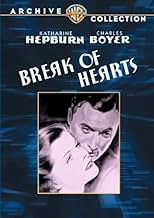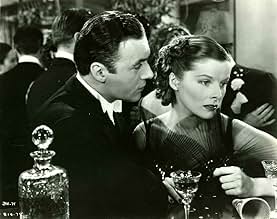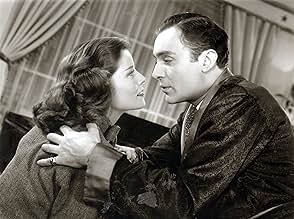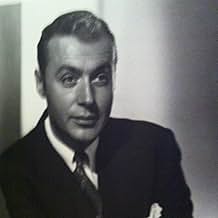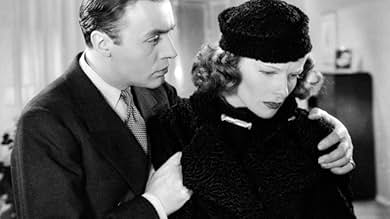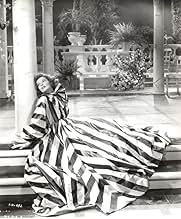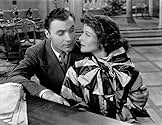Ajouter une intrigue dans votre langueFranz Roberti, orchestra conductor with multiple girlfriends, meets aspiring composer Constance through Professor Thalma. They marry, honeymoon across Europe, but Constance leaves after find... Tout lireFranz Roberti, orchestra conductor with multiple girlfriends, meets aspiring composer Constance through Professor Thalma. They marry, honeymoon across Europe, but Constance leaves after finding Franz with a divorcee.Franz Roberti, orchestra conductor with multiple girlfriends, meets aspiring composer Constance through Professor Thalma. They marry, honeymoon across Europe, but Constance leaves after finding Franz with a divorcee.
- Réalisation
- Scénario
- Casting principal
- Récompenses
- 4 victoires au total
- Albert Henderson
- (non crédité)
- Messenger
- (non crédité)
- Man in Hotel
- (non crédité)
- Max
- (non crédité)
- Radio Announcer
- (non crédité)
- Mr. Lubin
- (non crédité)
Avis à la une
Overall, while the acting is pretty good and a nice looking production, the movie itself is very ordinary...at best. In fact, some parts are a bit embarrassing to watch--it just wasn't written all that well and seemed overdone and unreal--particularly in the second half. A sticky and clichéd soap opera and not a whole lot more. There just wasn't enough interesting material in this film to elevate it anything more than a time-passer. Too bad--with this talent, it should have been a lot better.
Boyer is a Tiger Woods-Jesse James type - he's a conductor who marries a young fledgling composer, is caught cheating on her, and she leaves him. Then he hits the skids.
Predictable '30s drama. Both Boyer and Hepburn are ridiculously young and very attractive. Boyer is quite charming and moody as the conductor. Considering their respective careers, this is really just a blip on the radar.
This is all about Boyer and Hepburn. They have a bit of chemistry but I wouldn't call it heated. They are a bit too cerebral. They need a better meet-cute to start off the movie. The relationship is at medium simmer rather than maximum heat. The movie can't elevate that high even with the drama. Nothing is that in doubt. The hurdles aren't that high. It simmers but it never boils.
World famous conductor and womanizer Franz Roberti drops by an old friend's and meets Constance Dane a music teacher and aspirant composer. He's pleasant to her but no more. When she can't get a ticket to his sold out show she sneaks into a rehearsal and creates a scene that first annoys and then charms Roberti. They go out and Roberti lays out his Casanova MO to her but much to his surprise finds himself falling in love and marrying her. They globe trot on their honeymoon and all is well until she discovers he has returned to his old ways and decides to leave him. Crestfallen they almost reconcile but she rejects him and he takes to drink sabotaging his career.
The early scenes between the pair falling in love has a charming energy as Boyer's dark eyed intensity and magnificent inflection charm Hepburn's bedazzled beauty. But once the honeymoon ends and Constance books the film descends into a mawkish affair it can't climb out of with both leads becoming a touch too strident.
Philip Moeller's direction is flat and uninspired as he relies heavily on Hepburn close-ups and Boyer's roving eye to make his point. Advancing the story choppily and with little form in the process the glossy sets and lavish costumes lack the sweep they deserve with Moeller's camera movements tentative at best.
The most ironic moment in the film is when Hepburn launches into discourse on how she will look out for the sodden Roberti eerily reflecting her relationship with Spence a decade away.
Le saviez-vous
- AnecdotesAmong the many women whose photos adorn Franz Roberti's apartment is a very blonde Lucille Ball, who was an RKO Radio contract player at the time this film was made.
- Citations
Franz Roberti: I feel better.
Constance Dane Roberti: Did you feel badly?
Franz Roberti: You don't have to feel bad to feel better.
- ConnexionsReferences L'étoile du Moulin Rouge (1934)
- Bandes originalesSymphony No. 9 in E minor 'From the New World'
(1893) (uncredited)
Written by Antonín Dvorák
Excerpts played at a concert
Meilleurs choix
Détails
- Date de sortie
- Pays d’origine
- Langues
- Aussi connu sous le nom de
- Corazones rotos
- Lieux de tournage
- Société de production
- Voir plus de crédits d'entreprise sur IMDbPro
Box-office
- Budget
- 427 000 $US (estimé)
- Durée1 heure 18 minutes
- Couleur
- Rapport de forme
- 1.37 : 1
Contribuer à cette page


